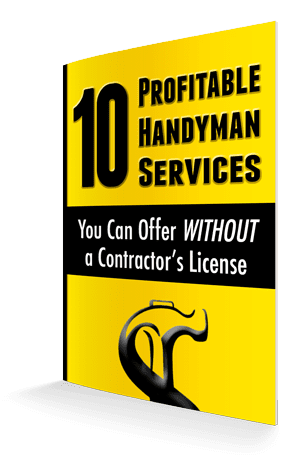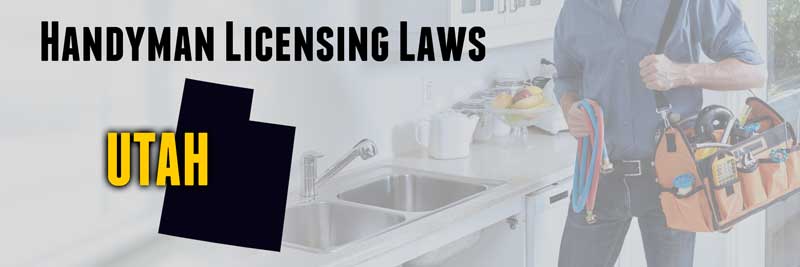Utah is a handyman-friendly state, which means that they allow handymen to perform a wide range of services without obtaining a contractor’s license.
Here you’ll learn everything you need to know about handyman licensing, specifically for the state of Utah.
I’ve poured over the laws and regulations and put the difficult-to-understand legal jargon into a simple-to-understand summary.
Do you need a license to be a handyman in Utah?
No, there is no handyman license. You can perform many home repairs, maintenance, and improvements without a license. However, there are limitations on what you can do as a handyman.
Utah Handyman Requirements and Limitations
There is a limitation on the dollar value of a job you can work on without a contractor’s license in most states. In Utah, that amount is relatively high, and you can do jobs up to $3,000 as long as those jobs do NOT include:
- Electrical work
- Plumbing work
- HVAC work
- Alarm system work
- Radon mitigation or soil depressurization
- Jobs that are considered to significantly impact the public’s health, safety, and welfare.
When I say “work,” I mean installation, repair, or replacement. That $3,000 includes labor and materials and any adjustments to the contracted price of the job.
Even though you don’t need a license to do jobs up to $3K, you’ll need to take extra steps if you plan to do jobs above $1,000.
To do jobs over $1,000, you must:
- File with the division (click here to get the form)
- Have the appropriate amount of liability insurance.
- Have workers comp (if you have employees).
The $3,000 limit is one of the highest of any state in the U.S., making starting a handyman business in Utah very appealing. To give a comparison, the limit in California is a mere $500 (which includes labor and materials), and yet I’ve still helped hundreds start a profitable handyman business in California. Small jobs can be surprisingly profitable.
In my state (Nevada), the dollar limit on jobs is $1,000. I’ve been running my handyman business for nearly ten years profitably and still have no desire to obtain a contractor’s license.
So, in Utah, you have even more services you can provide, which is nice if you like the slightly larger projects.

FREE REPORT: “10 Profitable Handyman Services You Can offer WITHOUT a Contractors License”
Stop waiting and start making money with these 10 profitable services anybody can offer.
Exceptions for Plumbing and Electrical Work Without a License
Of course, the laws are more specific than what I’ve listed above. There is some language in the laws about doing minor electrical or plumbing work. For example, here is an excerpt taken from the Utah Construction Trades Licensing Act, 58-55. It was taken from a section about plumbing work you can do without a license.
“(i) a person engaged in minor plumbing work that is incidental, as defined by the division by rule, to the replacement or repair of a fixture or an appliance in a residential or small Utah Code Page 25 commercial building, or structure used for agricultural use, as defined in Section 15A-1-202, provided that no modification is made to:
(A) existing culinary water, soil, waste, or vent piping; or
(B) a gas appliance or combustion system; and
(ii) except as provided in Subsection (1)(e), installation for the first time of a fixture or an appliance is not included in the exemption provided under Subsection (1)(k)(i);”
Now, I’m not a lawyer, and this is NOT legal advice, but here’s how I read this. It’s basically saying that you can replace faucets and appliances, fix toilets, etc. as long as you aren’t modifying piping or dealing with a gas appliance, or installing a fixture or appliance for the first time. So, no new installation of plumbing fixtures and no modifying piping. That probably rules out plumbing valves as well.
As far as electrical work goes, there are also exemptions. In a section that discusses exceptions to the rule of no electrical work, the laws state that you can do electrical as an unlicensed handyman if you meet the following criteria:
They mention the electrical required to install a prebuilt hot tub. But, I assume they are also saying you can perform jobs like installing a ceiling fan or changing a light fixture.
Basically, don’t rewire a house’s electrical system unless you’re an electrician, and seek legal advice before running any new electrical.
Of course, this is all just my opinion, and I am NOT a lawyer. To be sure what you can and cannot do, consult a legal professional who has a deep knowledge of contracting laws in Utah. They will interpret these laws with more authority and potentially review any precedent for citations.
Or, stick to jobs that are obviously within limits, like I demonstrate in the free report further up on this page.
And, if you can, I also recommend speaking to an investigator that hands out citations for contracting without a license since they are the ones enforcing the laws.
To read the laws for yourself, visit this website: http://www.dopl.utah.gov/licensing/handyman.html.
Already offering handyman services in Utah?
If so, I’d love to hear your thoughts. Please leave a comment below to share your knowledge or experience.

So I understand that the overall cost of a job has to be under 3,000$. But what if you split a job up. Say for instance if you were doing roofing. No way you can do a roof under 3,000$. It would average around 8 actually. Obviously you can’t do the whole job because of the restriction. But could you split the job up into sections. Say, 1. Roof Underlayment 2. Tar paper 3. Shingles 4. Drip edge and flashing. If you set it up as 4 separate bids and labeled it in your business as 4 separate jobs. Could this be done/ is it legal?
First I’m a retired inspector and part time handyman in utah.
I hold a contractors licence myself (NOT THAT DIFFICULT… if you know what your doing!)
$3000 includes the job, START TO FINNISH, and must include all time and materials!
Read the Law!
Also a reroof requires a jurisdictional permit in most utah jurisdictions…
Usually around $50 to $150 depending on the jurisdiction.
Their approval and a PASS on an inspection means you did an ok job and met the minimum requirements. This might just save your bacon if you need to go to court to get paid. (REAL EXPERIENCE SPEAKING HERE)
just my $.02
IT
Thank you. Can you confirm if a licenced handman can work on a new house/construction? E.g Tiling 4 bathrooms on a new house? Or woudl they require a conractor license?
No, not under. It INCLUDES $3000.
Please help I recently got a $1,000 fine from dopple stating that from my ad they think that somebody could misunderstand it and think that I could possibly repipe their house or fix major Plumbing all my ad says is do you have bad Plumbing if so please contact me I would love to help that’s it it doesn’t say anything else and the investigator called me saying well I think somebody could think your ad means this or I think somebody could think that your ad says that so he’s basically giving me a fine over what he thinks somebody might think of my ad and I need to fight this and I don’t know how to so please help
Honestly I dont see how someone wouldn’t assume you are advertising full plumping services. I’d be surprised if a judge would side with you.
Minority Report, who cares what people assume. If you don’t go in representing yourself as a licensed plumber then you haven’t broken the law.
I know it’s been 2 years ago but was you able to fight this? Did you get a lawyer. That sounds like you got bullied, not break the law
If you don’t need a handyman license, but Utah offers one, what are the advantages of getting one?
What if I wanted to build playhouses. From what I gathered, I do not need a permit to build single story playhouses under 200 sq ft. Would this still fall under those guidelines of not exceeding $3000 if I don’t need a permit to build one in the first place?
Is there a limit of revenue per customer per year with a handyman license?
If I am looking to install bass moulding, doors and frames, with the client buying all material and I am only paid for labor, do I need to register if it is under 3,000? Also, if I replace stair baulsters, or replace wood baulsters with iron baulsters in stairs or banisters, again a job under 3k with materials and labor?
I was just curious if u can do smaller fence jobs in Utah without licences if you do need one what one do u need ?
I am a retired electrician of 51 years, held a masters license for 45 and a master contractors license for 39 years doing industrial electrical including power distribution and computer controlled assembly lines. I am from Kentucky and have retired to Northern Utah. I live in a senior community and find that many of my neighbors on a fixed income can’t afford to hire contractors for minor jobs, such as replacing bad receptacles, switches, light fixtures, yard sprinkler controls, etc. While I would like to help them out, I don’t fully know Utah laws as to what I can do without a Utah license or the liability involved.
Can someone help me with this?
I am also considering installing a whole house generator with automatic transfer for my home. Am I allowed to install it myself without a license?
Can you install hot water recirculating pumps as a handyman?
Ok so I have been doing some simple work at a 20 unit apartment building in a rural town in Central Utah. All of a sudden a difficult Tennant who got evicted calls DOPL . So the investigator says we have to stop work. I thought that I was savy enough with the rules. Come to find out my boss the owner is the one who didn’t do his homework. And now I have to get my Handyman exemption and insurance since he can’t do anything til he pays his fine and gets his own permit. Any ways since then everything’s been ok but today I get a call about a water heater. Electric and won’t heat not the breaker or reset. I could go fix it but I don’t want to get into trouble I’m in the process of getting my paperwork now and my insurance starts Monday. See we don’t have plumbers here that are available to just come look. So is there a reasonable situation” clause ” do you think or know?
Could house cleaning and construction cleaning fall under
The handyman law?
I’m a painter. My question is what if we do a job for somebody, such as painting the upstairs of their house, finish the job, charge $3000.00 and leave, invoice complete. Then a week later we get a call from the same client asking us to paint their basement since they were impressed with our work. Can I accept the job, or do I have to decline?